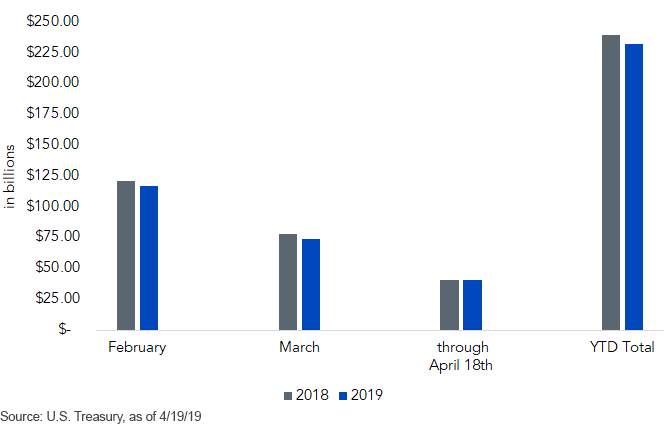Can I Get A Refund?
Another April 15 tax date has come and gone: That’s the good news. So, how did individual filers make out for the 2019 season versus a year ago? More importantly, is that highly anticipated refund check in the mail or, better yet, already deposited in your bank account?
Individual Tax Refunds

Certainly, last year’s Tax Cuts and Jobs Act takes center stage when trying to determine the fate of the individual filer. In any given year, economists like to look at the refund tallies to find any clues of what may potentially impact household spending as a result. In other words, was it a year of booming refunds that could be a tailwind for the consumer, or just the opposite—a disappointing year that could perhaps serve as a drag on outlays in the ensuing months?
There are two sources for obtaining the data in question: the Internal Revenue Service (IRS) and the Daily Treasury Statement (DTS). For this blog post, I focused on the DTS because the data is more up-to-date than the IRS figures, which tend to operate with a bit of a lag. Thus, I was able to collect numbers through April 18 for this year and compare them to the same date for the 2018 season. Traditionally, the refund season gets underway in February and runs through the end of April. Think about it: If you think you’re getting a refund, you’d probably want to file early to receive it early, right?
What did I find out? As the bar chart illustrates, this year’s overall experience has thus far come in modestly below the 2018 tally. On a year-to-date basis, individual refunds for 2019 are $232.37 billion, or 3.0% lower than last year. As you can see, the 2019 season got a bit “behind the eight ball” right from the start. Indeed, the tallies for February and March were 3.5% and 4.5% less than the 2018 figures, respectively. Some ground has been made up so far in April, but not much, with the 2019 refund number showing a +1.0% increase over 2018.
So, what should we make of the 2019 refund season so far? Two things come to mind. First, the government shutdown did apparently slow things down a bit from the start. However, now that we’re in the second half of April, any shortfall from this factor probably should have been made up for by now. Second, perhaps individuals received more of any potential tax benefits in their 2018 paychecks. In that case, refund totals could be impacted accordingly.
Conclusion
In any event, I don’t think the lower refund numbers should have a meaningful economic impact: So far, there just isn’t a large enough discrepancy. Rather, check out the lower interest rate setting. Now that could prove to be a more important factor. Have you seen 30-year mortgage rates lately? Perhaps that’s a topic for a later post!
Unless otherwise stated, data source is U.S. Treasury Department, as of April 19, 2019.
Disclaimer: Investors should carefully consider the investment objectives, risks, charges and expenses of the Funds before investing. U.S. investors only: To obtain a prospectus containing this ...
more


